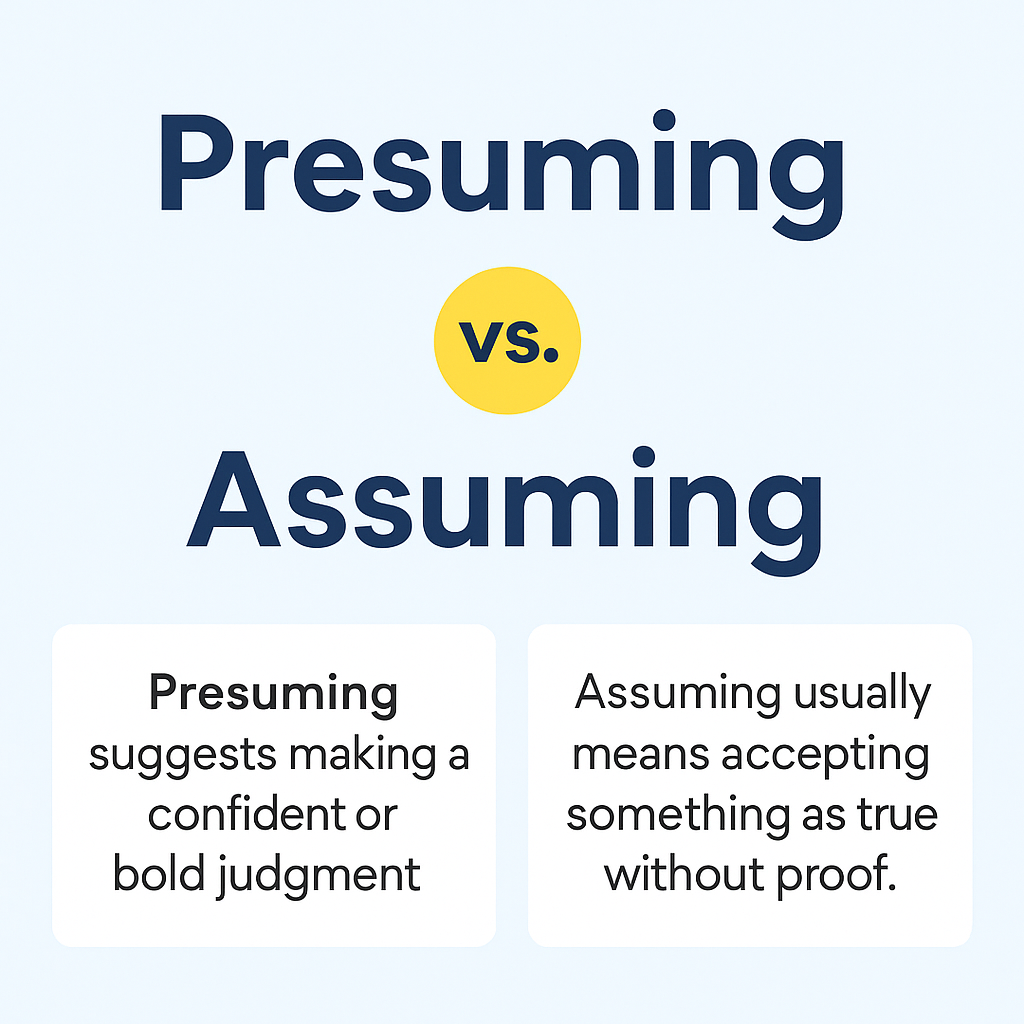Assume vs Presume (Presumption vs. Assumption)

Assume vs presume?
Both assume and presume involve making a judgment without complete proof. However, there is a key difference:
- Assume suggests making a neutral guess or expectation without evidence.
- Presume implies greater confidence or boldness, sometimes bordering on arrogance or entitlement.
Understanding whether to use assume or presume will help you communicate more clearly and avoid sending the wrong message. In this guide, we break down the grammar, provide real-world examples, and share memory tips to ensure you use these words correctly in every situation.
Related post: Lose vs Loose: Understand the Difference and Use Each Correctly
Explore more: See other commonly confused word pairs
Grammatical Explanation: Assume vs Presume
The difference between assume and presume comes down to certainty and attitude.
| Word | Part of Speech | Meaning | Example |
|---|---|---|---|
| Assume | Verb | To believe something is true without proof (neutral tone) | I assume you will join us for lunch. |
| Presume | Verb | To believe something is true without proof, but with confidence or boldness | I presume you will not mind if I borrow your book. |
Noun Forms:
| Word | Part of Speech | Meaning | Example |
|---|---|---|---|
| Assumption | Noun | A belief or guess made without proof (neutral) | Her assumption about the schedule was incorrect. |
| Presumption | Noun | A belief made with boldness or entitlement, often negative | It was a presumption to speak on behalf of everyone. |
Examples of Assume vs Presume in Real-Life Sentences
Correct Usage of Assume:
- I assume the package will arrive by Friday.
- Do not assume that everyone agrees with your opinion.
Incorrect Usage:
- Incorrect: I presume the weather might change later.
- Correct: I assume the weather might change later. (Neutral guess)
Correct Usage of Presume:
- Since your coat is still here, I presume you will be coming back.
- She presumed to speak on behalf of the group without asking anyone.
Incorrect Usage:
- Incorrect: I assumed to take your seat without asking.
- Correct: I presumed to take your seat without asking. (Shows boldness or entitlement)
Assumption vs Presumption Examples:
- Assumption: His assumption was that the store closed at 7 PM.
- Presumption: Her presumption that she could use my materials without asking was frustrating.
Common Mistakes with Assume vs Presume
The most common mistake is using presume for simple, neutral guesses where assume is more appropriate. For example:
Incorrect: I presume the meeting is at noon.
Correct: I assume the meeting is at noon. (No arrogance, just a guess)
Another mistake is choosing assumption instead of presumption when describing actions that are bold, confident, or even impolite.
How to Avoid These Mistakes:
- If the statement is neutral and involves guessing or expecting, use assume or assumption.
- If the statement is confident, bold, or overstepping, use presume or presumption.
Memory Tips for Assume vs Presume
Here are some easy ways to remember the difference between assume and presume:
- Assume = Average guess. Both words start with “a”—think of assume as the average or neutral option.
- Presume = Pushy or bold. Remember “presume = pushy” to connect it with confidence or entitlement.
Another quick tip:
You assume when you are unsure. You presume when you are sure enough to act without asking.
Conclusion: Assume vs Presume Made Simple
Knowing whether to use assume or presume helps you express the right tone in your writing and speech. Here’s the key takeaway:
- Use assume when you are guessing neutrally without proof.
- Use presume when you are acting on belief with confidence or boldness, sometimes without permission.
Paying attention to this subtle difference can improve the clarity and professionalism of your communication. To sharpen your word choices further, explore more of our commonly confused words series.